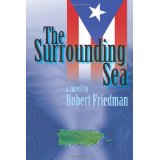
The Surrounding Sea, a novel by former San Juan Star journalist Robert Friedman, explores, among other things, crime and colonialism in Puerto Rico.
Among those other things is the coming-of-age story of Stévie Perez, born in Puerto Rico, bred in the Bronx, and branded by both worlds.
The year is 2000 and Stevie, who has returned to la isla and is a student at the University of Puerto Rico, is taking part with his girlfriend, Laura Rosario, in a campus protest against the U.S. Navy's bombing exercises that have caused illness, environmental damage and death on the offshore island of Vieques. The Riot Squad is called onto the campus and in the ensuing violence, Laura is hit by a stray bullet and killed.
A grieving Stevie vows to keep Laura's memory alive by creating a scholarship in her name. He is stymied in his attempts to get help in the community and decides to become a drug mule to get the scholarship money. After a few lucrative trips between the island and the states, he is set up in a drug theft. His 20-year-old life in danger, Stevie is forced to flee as the drug gang pursues him from the Bronx to mountain towns in Puerto Rico to the San Juan slum of La Perla.
Along the way, Stevie meets and makes loyal friends and fierce enemies, and learns hard truths about life, love and loss.
Friedman, said that he has tried in The Surrounding Sea to explore how the political and the personal interconnect, how one injustice triggers others, how wrong turns could be taken for seemingly right reasons. He has tried to do this by creating a gripping, suspenseful novel on a human scale, “the only measure that really matters in a work of fiction,” said the author.
Genre: FICTION / Action & AdventureThe flight was going smooth. The turbulence was in my stomach.
An acidy stomach could cause the latex to disintegrate, the
capsules could leak, burst—that would be it.
I had the burning inside, bile floating around in my chest and
sliding up into my throat, rotten eggs and metal in my mouth. I
could feel the heavy stuff moving around inside and I wanted to
puke it out.
I stumbled down the aisle to the back of the plane and into a
bathroom. I gagged over the toilet bowl. Nothing came up. Just
a little spittle. I tried again. Burning scraped around my chest
and throat, but only spittle came up. My heart was galloping. I
scrunched my head under the faucet of the tiny sink. I dried my
face and neck with paper towels, staggered back to my seat.
I told myself it was just nerves. Damnit! Calm down!
I’ve mostly transported it in luggage—you check the bag at
the airline counter in San Juan like any other passenger and the
baggage handlers receiving payoffs take care of it getting on the
plane. Then, just like the other passengers, you pick it up in New
York at the luggage carousel. When you land in the states from
Puerto Rico there’s no customs to go through. You just take your
bag to the nearest exit, smiling all the way at the other passengers
and the guards at the door, just another Puerto Rican kid happy
to be coming back to El Barrio for a visit. Then you make the
drop where you’re supposed to. For me, it was that same hotel on
the Upper West Side.
| Language | Status |
|---|---|
|
Spanish
|
Already translated.
Translated by María Emilia Ruiz
|